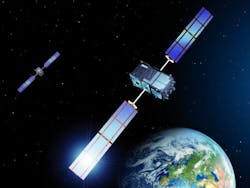Second pair of Galileo IOV satellites reach orbit
Guiana, 20 Oct. 2012. The second pair of in-orbit validation (IOV) satellites for Europe’s Galileo navigation system, developed and manufactured by Astrium, a European space technology company, have been launched aboard a Soyuz rocket from the European Space Center in French Guiana and are in orbit.
The two latest IOV satellites will soon enter into service in orbit with IOV satellites 1 and 2, which were launched in October 2011. The constellation will now be activated in order to validate the Galileo system. With these four satellites, launched into two different orbit planes, Galileo will be tested to see if it can deliver precise three-dimensional positioning.
Galileo is Europe’s first global satellite navigation system under civilian control. It will supply positioning data worldwide.
The definition phase and the development and In-Orbit Validation phase of the Galileo program were conducted by the ESA and co-funded by it and the European Commission.
The full operational capability phase of the Galileo program is both managed and funded by the European Commission. The Commission and ESA have signed a delegation agreement under which the ESA is authorized to act as the design and procurement agent on behalf of the Commission.
Astrium and its subsidiaries will be contributing half of the workshare for the next satellites, delivering the Ground Control Segment (GCS), taking part in system support activities and adapting Ariane 5 for the launch of 4 Galileo satellites at a time.
The Galileo IOV satellites were designed and built by an Astrium team led from Ottobrunn, Germany. The navigation payload was designed, integrated and tested at the company’s payload center of excellence in Portsmouth, United Kingdom.
In addition to overseeing the development of the Galileo IOV satellites, Astrium has developed and installed the Galileo ground control segment (GCS) which is used by the operations team to control and command the satellite constellation in orbit. Astrium is also involved in system support activities for Galileo. In February 2012, Astrium received a contract from ESA to adapt the Ariane 5 launcher for a Galileo mission involving the simultaneous launch of four satellites.
